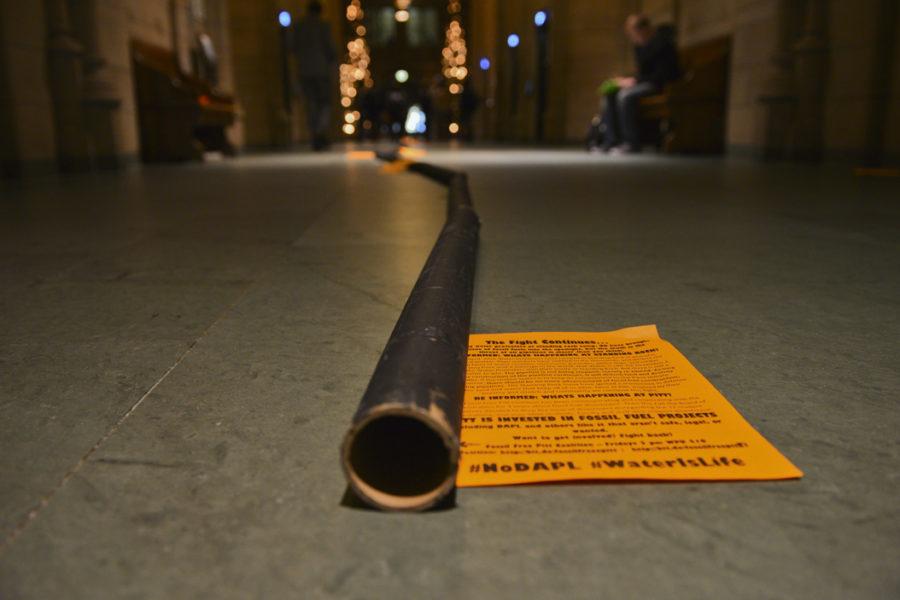Op-ed: SGB inaction fails economic and environmental justice
Members of the Fossil Free Pitt Coalition set up a cardboard “pipeline” in the Cathedral in December 2016 in protest of the pipeline on Standing Rock’s reservation.
February 11, 2019
Student Government Board elections are upon us. The Pitt administration says this is how students get a voice and fair representation, but I don’t believe that SGB truly represents the interests of the student body.
Year after year I’ve been told by candidates that they want to work with us on student initiatives, only to be let down by the same excuses.These are intelligent, strong students that have great ideas. That is exactly why I voted for them. Yet, I’ve found that many lack the backbone to follow through with their pre-election promises. SGB members appear to play at politics to gain personal status rather than truly fighting for the student body.
Despite tuition and the costs of living in Pittsburgh increasing rapidly, the existing state minimum wage has not changed in 10 years. Pitt had to make a food pantry to address the immense food insecurity on this campus. Pitt remains at the top of the list of average debt per graduate.
Nevertheless, Pitt still pays its students poverty wages. Pitt students have tackled this head-on and demanded higher wages in the Fight for $15. SGB could have supported the fight for a higher student wage by passing a resolution of support, as requested by student organization United States Against Sweatshops. But SGB chose not to do so.
Pittsburgh’s location at the heart of the fossil fuel industry has influenced students to take action. Our county parks are fracked. The largest longwall mine in North America is right next door. These industries have systematically destroyed communities, polluted our air and water and contributed massively to climate change. The University has recognized how severe the consequences are and has responded with a pivotal Pitt Sustainability Plan released last January. Once again, SGB has turned down the request to pass a resolution to support divestment.
SGB has failed to act on climate change. The administration has taken steps to address this. The senate faculty has also addressed this issue by forming ad hoc committee on divestment. The Fossil Free Pitt Coalition — the group that leads the divestment campaign — is made up of 50 student SORC recognized clubs, and has collected over 5,000 student, faculty and staff signatures of support. The students have pushed the University to create the Socially Responsible Investment Committee, which held two forums last semester to hear community concerns and ideas regarding how the University should utilize its endowment. At the forum, many supported the possibility of the University breaking ties with their fossil fuels investments.
So why is SGB failing to represent the needs of the student body?
Throughout the last three years of requests for resolution, SGB continued to express concerns about administrative backlash, but this is not how the student government board is supposed to represent the student body. If they consider administration before acting for the student body, there is no purpose of having a student government.
This election season, we must demand more from SGB candidates. We need an SGB that will stand up to the administration and Board of Trustees when their activities run counter to the interests of students.
If students want their voices to be heard, we must empower and encourage SGB to represent us. I urge you to know about the candidates this election season. Ask them hard questions. Once members are elected, treat them as your representatives. Call SGB. Email them. Go up to their office on the eighth floor of the William Pitt Union. Demand that they represent the student body and hold them accountable to the promises they’ve made.
As students, we have the potential to enact incredible change, but only if we speak up and demand it.








